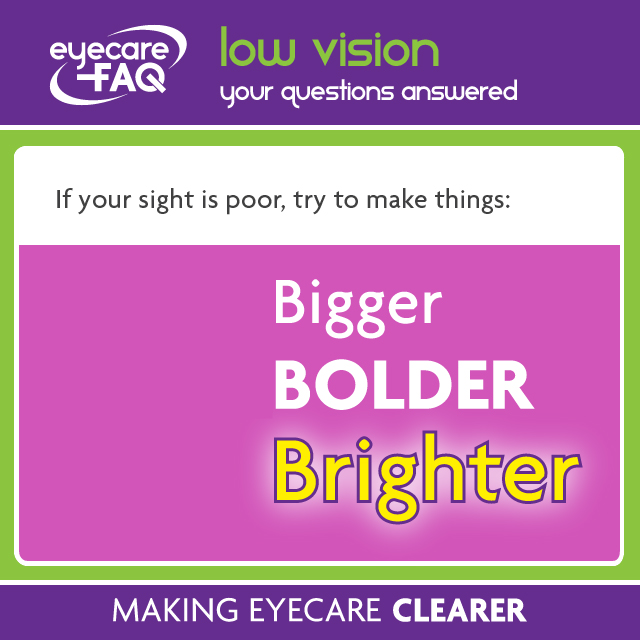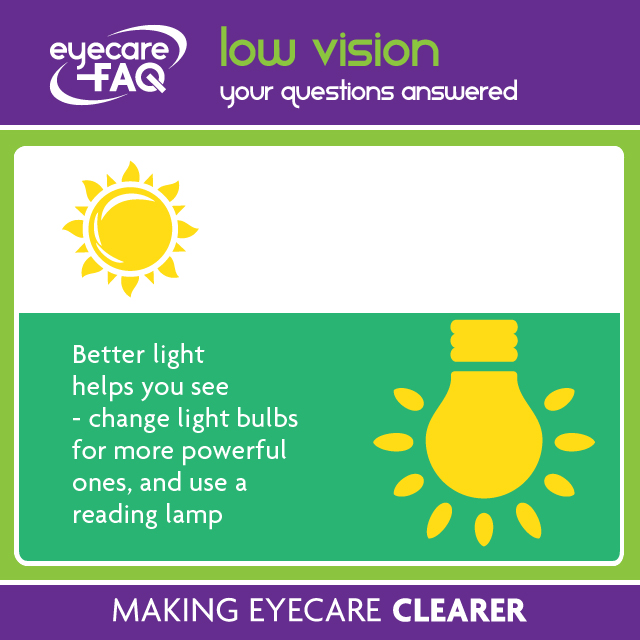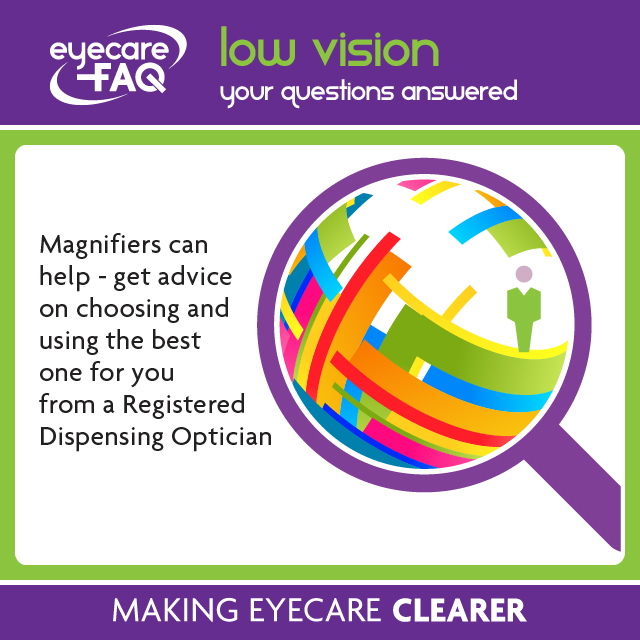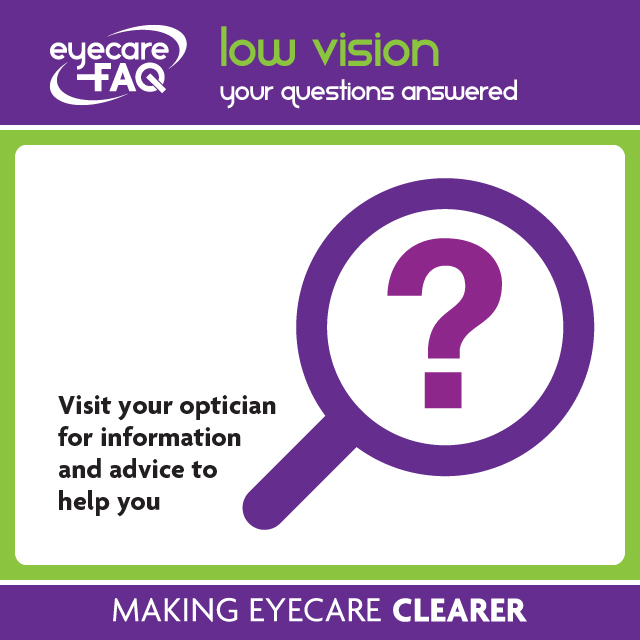I’m worried that my sight isn’t as good as it used to be. What should I do?
Are you concerned that your sight is not as good as it used to be? If so, you’re not alone. There are 1.8 million people in the UK with some level of sight loss. Have you visited an eye specialist yet? This is the first step to finding out about your sight loss. Visit an optometrist or ophthalmic optician: you can usually find a local practice on every high street. They can check your sight and see if your vision can be improved by glasses. An optometrist will also check the health of your eyes and can detect signs of eye disease. Many eye diseases are treatable, but act quickly as the sooner some conditions are treated, the easier it is to preserve your sight.
I know my vision isn’t great: what can I do to make it easier to see things?
There are three simple principles that will make your life much easier if your sight is poor. Try to make things: Bigger – Bolder – Brighter – and you’ll find it easier to do everyday tasks and enjoy life.
How do I make things bigger and easier to see?
The larger something is, the easier it is to see. If you struggle with tasks such as using the phone, check out resources like the RNIB shop: where you can find phones with large numbers on large buttons, watches with large clear numbers, easy to see kitchen scales, and large print games like scrabble.
I’ve bought a magnifying glass but it doesn’t help. Do you have any tips?
A magnifier makes the things you want to see bigger and usually clearer. Although magnifiers are easier to use and transport than other aids there are many different types of magnifying glass, so you should get advice about which one will help you. There are techniques to learn to make the most out of any magnifier. An optician is trained to advise on low vision and help you learn to use the sight you have.
How do I make things bolder and easier to see?
Bold lines are easier to see than faint ones, so to make it easier at home why not buy a pack of black marker pens with a medium thick or thick nib. This will allow you to write notes more easily and read back what you have written.
If you struggle with navigating your home, think about whether you can use bold black or white lines to help. A contrast strip on the edge of a stair can make it stand out, and contrasting tape on hard corners can save you from knocking yourself each time you pass.
How do I make things brighter and easier to see?
If you find something hard to see, better light will always help. Try changing light bulbs for more powerful one. Try and have the light close to what you want to see, the closer the light is the brighter it will appear and will improve the vision. Having an extra reading lamp that can shine over your shoulder when you look at a book is a great example. Look at the places where you find things difficult to see and think about whether you could add in extra light.
I’ve just been told that my sight loss is permanent and feel like I’m in shock. How will I cope? Who can help?
If you have low vision that cannot be remedied with glasses, medication or an operation, there are still lots of things that can help you make the most of the sight that you have. At the hospital you should be put in touch with a low vision specialist who can assess you and recommend magnifiers or other technology to help.
Ask if you can be assessed by a rehabilitation officer who can help with practical adaptations to your home. You should also ask about mobility training, to help you get about independently.
The hospital or your GP may also be able to point you towards local support groups and a contact at Social Care. Social Care may be able to assist with equipment to make day-to-day life easier, including speaking clocks and telephones with larger numbers.
What sort of magnifying glass will help me?
There are lots of different types of magnifying glass available and choosing can feel bewildering. Don’t pick at random: different types of magnifier work better for different people, different types of sight loss, and different situations. You might benefit from a pocket magnifier to take shopping with you, but find a stand magnifier or a CCTV system gives you much better results when you want to read more than a few words. Some magnifiers have built in lights which can help you see better. Talk to a dispensing optician: they are trained to advise on the different types of magnifier so you get the one that works best for you.
Should I choose a hand magnifier or a stand magnifier?
A hand magnifier can be more portable than a stand magnifier, but a stand magnifier may be more stable and better for longer tasks. Both hand and stand magnifiers come in a range of powers, with and without illumination. A stronger magnifier will make things larger, but you will only see a small part of what you want to read at a time. You’ll also need to work at a closer distance for the best focus. Talk to a dispensing optician: they are trained to advise on the different types of magnifier so you get the one that works best for you.
When should I use a hand magnifier?
Small hand held magnifiers are great for reading a few words, such as on a menu, price tags, ingredients, thermostats, or prescription bottles. Hand magnifiers are available in a wide variety of designs and magnifications. Many are illuminated to provide additional light. Hand held video magnifiers are now available too, providing good magnification and a flexible viewing distance. Talk to a dispensing optician: they are trained to advise on the different types of magnifier so you get the one that works best for you.
Who does a stand magnifier work well for?
Stand magnifiers work well for you if you want to read books, magazines and for some writing tasks. Stand magnifiers rest on the page and don’t have to be held, so they are ideal for people who are not strong enough to hold a hand-held magnifier for any length of time as well as those whose hands shake. If you wear reading spectacles these should be worn when using the magnifier to read. Talk to a dispensing optician: they are trained to advise on the different types of magnifier so you get the one that works best for you.
Which magnifying glass is best for writing?
It can be tricky to write with a magnifying glass: you need to juggle the pen, paper and magnifier. Some strong magnifiers need to be held close to your face and close to the paper which is also tricky. A stand magnifier means that the magnifier is held steady over the page: when choosing make sure that you try out writing and ensure that there is enough space for your hand and pen. Talk to a dispensing optician: they are trained to advise on the different types of magnifier so you get the one that works best for you.
Can I get magnifiers incorporated into my specs?
Spectacle magnifiers allow you to work without holding a magnifier. They can be good for reading and writing. The lenses may be thicker and heavier than your old glasses, but this can be improved with modern lens designs and materials. You will need to hold your reading matter closer than you might expect. You will need to change spectacles for distance vision. Good lighting will help you make the most of your new specs. Talk to a dispensing optician: they are trained to advise on the different types of magnifier so you get the one that works best for you.
My magnifier isn’t helping – what should I do?
Magnifying glasses need a little practice to be most effective. Start by checking the distance at which you should be holding the thing you want to look at: this may be noted on the magnifier. If not, start with the magnifier half way between your eyes and the object. Move the magnifier closer and further to check the most effective distance. You may find that you need to bring the object closer than you might expect: the more powerful the magnifier the closer you need to work. Talk to a dispensing optician: they are trained to advise on how to make the most of your magnifier. Sometimes a change in vision can mean that your eye condition has changed too: if you have previously managed with a magnifier and it is no longer effective you should go back to your eye specialist.
What power magnifying glass should I use?
A strong magnifier will make things larger, but you will only see a small part of what you want to read at a time. The stronger the magnifier, the smaller area you will see. You’ll also need to work at a closer distance for the best focus. Different strengths of magnifier work well for different people and different tasks, so it is worth calling into an optical practice that offers a range. Ask to speak to the registered dispensing optician. They are trained to advise on the different types of magnifier so you get the one that works best for you.
Tell me about CCTV and electronic magnifiers for low vision
If you need a large degree of magnification and are frustrated with how few words you can see using a traditional magnifier, a system with a TV screen and a camera may work well for you. You can adjust the magnification and the words are displayed on the TV screen at the size you choose. This can lead to a more comfortable working position too, compared to bending over a magnifier. This type of system of more expensive than a traditional magnifier. There are different versions: you can choose from a complete system, a camera reader on a stand that plugs into your computer monitor, laptop or TV, or small pocket versions. The complete system includes lighting to illuminate what you are reading, and it allows you to see what you are writing too. If you want to find out more, talk to a registered dispensing optician and they can arrange for you to try out a system.





